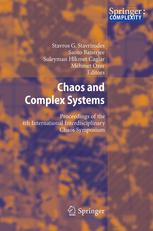

Most ebook files are in PDF format, so you can easily read them using various software such as Foxit Reader or directly on the Google Chrome browser.
Some ebook files are released by publishers in other formats such as .awz, .mobi, .epub, .fb2, etc. You may need to install specific software to read these formats on mobile/PC, such as Calibre.
Please read the tutorial at this link: https://ebookbell.com/faq
We offer FREE conversion to the popular formats you request; however, this may take some time. Therefore, right after payment, please email us, and we will try to provide the service as quickly as possible.
For some exceptional file formats or broken links (if any), please refrain from opening any disputes. Instead, email us first, and we will try to assist within a maximum of 6 hours.
EbookBell Team

4.7
36 reviewsComplexity Science and Chaos Theory are fascinating areas of scientific research with wide-ranging applications. The interdisciplinary nature and ubiquity of complexity and chaos are features that provides scientists with a motivation to pursue general theoretical tools and frameworks. Complex systems give rise to emergent behaviors, which in turn produce novel and interesting phenomena in science, engineering, as well as in the socio-economic sciences.
The aim of all Symposia on Chaos and Complex Systems (CCS) is to bring together scientists, engineers, economists and social scientists, and to discuss the latest insights and results obtained in the area of corresponding nonlinear-system complex (chaotic) behavior.
Especially for the “4th International Interdisciplinary Chaos Symposium on Chaos and Complex Systems,” which took place April 29th to May 2nd, 2012 in Antalya, Turkey, the scope of the symposium had been further enlarged so as to encompass the presentation of work from circuits to econophysics, and from nonlinear analysis to the history of chaos theory.
The corresponding proceedings collected in this volume address a broad spectrum of contemporary topics, including but not limited to networks, circuits, systems, biology, evolution and ecology, nonlinear dynamics and pattern formation, as well as neural, psychological, psycho-social, socio-economic, management complexity and global systems.